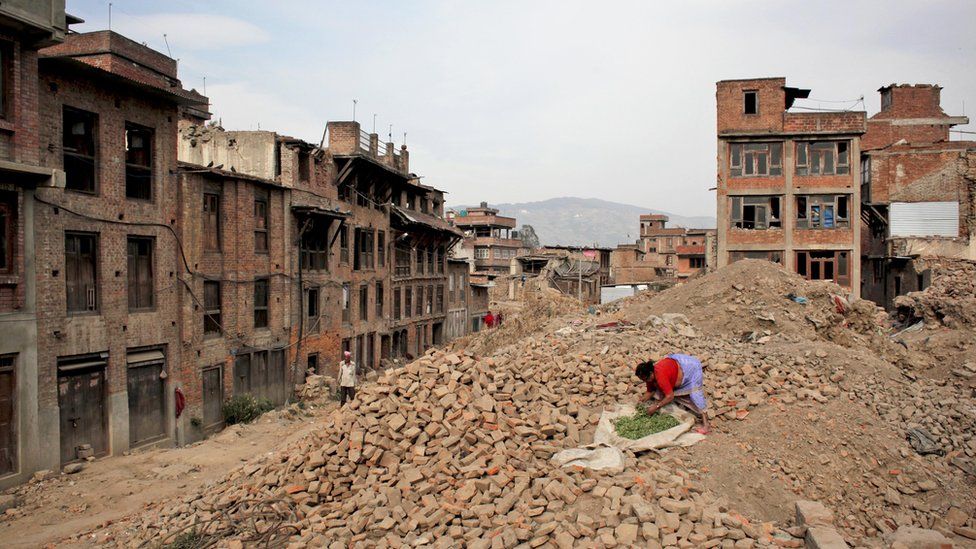Nepal earthquake: Patience wearing thin one year on
- Published

A year after the earthquake and Nepal is still a country of tarpaulins, tents and tin-roofed shacks.
I had imagined rebuilding would have begun, but it is as if the country has been frozen in time.
The streets have been cleared of rubble and the most obviously unstable structures have been brought down, but that is where the so-called "reconstruction effort" stopped.
Virtually none of the 800,000 buildings it is reckoned the quake destroyed have been rebuilt.
The lack of progress is most stark in the countryside. Whole villages are still shattered and broken.
I am expecting boiling anger when I go back into one of the worst-hit provinces, Sindhupalchowk.
But instead I find something much more depressing: hopeless resignation.
'No-one has helped us'
We first met Beli Bishta, a mother of three, the day her husband had been killed by one of the series of massive aftershocks that followed the first big quake.
The family was in white robes and her two sons had shaved their heads in the traditional Hindu ritual of mourning.
A year on and her situation is no better, in fact if anything it has only got worse.
"We have lost everything," she told me. "No-one has helped us. I've had to sell our land. It is the only way we could manage."
The family is still living in a flimsy one-room tin shack built in the wreckage of the old family home.
It is a picture repeated across the country.
According to the Red Cross, four million people are still living in sub-standard temporary shelters.
The victims of the earthquake have received some small payments from the government - for hardship and compensation for the loss of relatives - but it promised it would also give every family that has lost a home $2,000 (£1,390) towards the cost of rebuilding.
Most of that money has not been paid.
Nepal's two devastating earthquakes
25 April 2015 - a 7.8-magnitude quake hits the capital Kathmandu and its surrounding areas, killing more than 8,000 people
Some 120 aftershocks follow
12 May 2015 - a second major earthquake, magnitude 7.3, hits in eastern Nepal, near Mount Everest. More than 100 people are killed and thousands more injured
Among the worst-hit districts was Sindhupalchok, where more than 2,000 died, and Kathmandu, where more than 1,000 perished
Many of the country's historic sites were severely damaged, including temples and monuments. At least four out of seven Unesco World Heritage sites in the Kathmandu valley were badly affected.
Read more:
'It is reality'
Like hundreds of thousands of other Nepalis, Beli Bishta says she worries that if she starts to rebuild the family will not be eligible for the cash.
You might think that the appalling state so many earthquake-hit areas of Nepal are still in would be a fatal indictment of the government.
Nepal PM: Corruption allegations are 'rumours'
How could any administration leave its people in destitution and still expect a mandate to govern?
But Nepali Prime Minister KP Oli appears to see himself as much of a victim of circumstance as earthquake survivors like Beli Bishta.
When I ask whether he is happy about the speed of reconstruction, he doesn't try to dodge the issue.
"Of course it is slow," he says. "It is late. I am not happy, but it is reality and I have to accept the reality and go ahead."
Nepal is a desperately poor country and many of the homes destroyed are in very remote areas, he tells me.
But, as I point out, that isn't enough to explain the lack of reconstruction effort.
Constitutional battle
The world community came together in sympathy in the weeks after the quake struck, pledging $4.1bn (£2.87bn) towards the rebuilding of the country.
That money is still waiting to be spent.
When I ask about corruption, Mr Oli says he finds my question "humiliating", and suggests that some charities have raised the issue as a way of encouraging donors to give them money, rather than the government.
But corruption is a real concern in a country languishing in the bottom ranks of the anti-corruption organisation Transparency International's league tables.
He argues the main cause of the delays has been a political upheaval in the country.
It is true that, instead of tackling the earthquake damage, Nepal's politicians became caught up in a heated battle over the details of a long-overdue new constitution.
The details had been in discussion since the monarchy was abolished in 2008.
The hope was that fast-tracking the constitutional negotiations would speed up reconstruction. But, in the event, the opposite happened.
After six months a new constitution was approved but it prompted a revolt amongst the ethnic groups in the lowland regions between Nepal and India, which led to a protracted blockade of the border.
Losing patience
That, in turn, caused shortages of essential supplies including food and fuel.
"They are angry, they are bereft, but the Nepali people also read the newspapers, they know why what is happening is happening," says the veteran Nepali journalist and political commentator, Kanak Mani Dixit.
We are talking on a balcony overlooking the broken stump of the Dharahara tower that once dominated the Kathmandu skyline.
It now jabs up from its plinth like an accusing finger.
"We did OK in rescue and relief," says Mr Dixit. "But then the politics of constitution writing took over and it was a very polarising event. And that was followed by the blockade, which brought a humanitarian crisis on its own."
The people may understand the delays but, out in the countryside, I sense patience wearing thin.
The prime minister assured me that the first money was being released as we spoke last week.
Having endured the monsoon and Nepal's harsh winter, and with another monsoon on the way, it cannot come too soon.
- Published21 April 2016
- Published21 March 2023